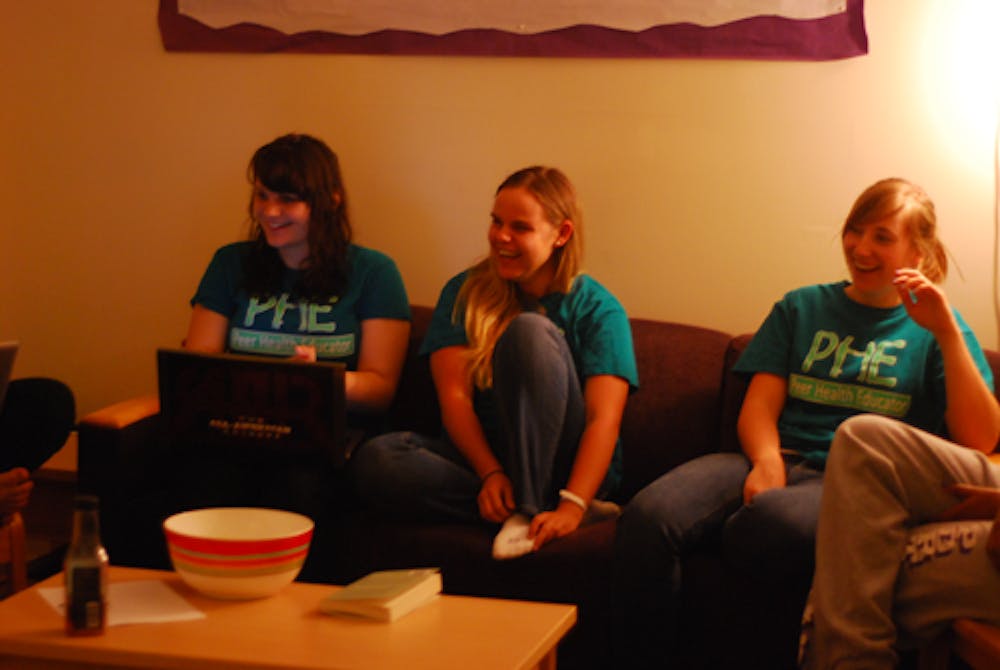Funding for the PHE program will be reallocated to other Health Center programming
Each of the six Peer Health Educators receives a housing stipend from the University. The program puts on functions like student alcohol education events. From left to right (Jackie Jeffers | THE BEACON )
By Philip Ellefson, Staff Writer ellefson15@up.edu
Next year, bathroom stalls on campus may no longer be decorated with "Potty Posts" informing students about health and wellness. Instead of students leading alcohol education events, staff members may organize them. And there will no longer be a student wellness liaison for each dorm.
The Peer Health Educator (PHE) program will be cut next year, and its funds will be reallocated to other programming. According to Health Center counselor and PHE adviser Kristina Houck, funding cuts across campus prevented the program from improving.
"We see it as a really successful program, as it has been, and for it to reach more students, we would need more funding," Houck said.
The majority of the PHE budget goes toward a housing stipend for the PHEs. Each of the six PHEs receives a $1,275 housing stipend each semester, meaning the University spends $15,300 on housing for PHEs each year. Houck hopes these extra funds will help the Health Center reach more students.
Director of Health Services Paul Myers hopes to give more money to violence prevention programs.
"Green Dot is part of our violence prevention strategy, but it's only one part," Myers said. "Right now, it's funded by a federal grant."
In addition to providing education about sexual violence and legal consent, Myers plans to distribute more funds to alcohol and drug prevention education and programs for eating disorders.
But PHEs are concerned new programs won't connect students with peers. Sophomore Kellie Riper, a PHE, thinks wellness education is more successful in peer-to-peer settings.
"It's very important to hear it from someone who's living the same way you are, versus someone who isn't living the same student life you are," Riper said.
Hellina Gesese, a senior PHE, said Pilot Pride, an event the PHEs put on for incoming freshman, is successful because other students lead it.
"Other students at UP sharing with you, 'This is what we do, this is how we behave,' rather than a staff member saying, 'This is what's expected of you,'" Gesese said. "I think it has a different tone and is received differently."
Myers acknowledged that some programs are best led by students, including an alcohol education class for students who have violated the University's alcohol policy.
"I do have concerns that students get content differently from staff than they do from students," Myers said. "Because of the age difference, there's definitely a different response."
But Houck said the Health Center will look to other student leaders to fill some of the roles of the PHE program.
"Certainly there's a hope that there will be a way that students can be involved in wellness education," Houck said. "What that is, I do not know."
Myers said the Health Center plans to work with clubs, RAs and CPB to plan events that would fill the gaps left by the PHE programming.
In addition to cutting the PHE program, Houck's job will change next year. She will no longer be a counselor in the Health Center instead focusing on promoting wellness on campus. According to Myers, this will allow the Health Center to restructure its counseling staff and create efficiency.
"It really does fit into a larger picture of how we are redesigning our care," Myers said.
Riper regrets seeing the program cut.
"We don't get a super high number of people attending our events, but the people who are there genuinely enjoy it," Riper said. "And even if we reach only a couple hundred students every year, it's the couple hundred that are looking for that change."
(Jackie Jeffers | THE BEACON)
(Jackie Jeffers | THE BEACON)








